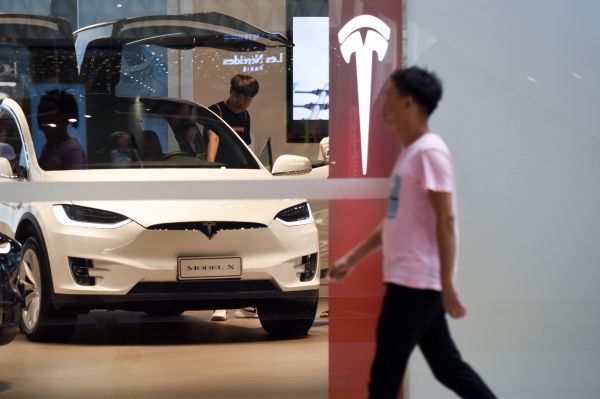Tesla plans to speed up construction of a factory in Shanghai as tariffs, shipping costs and missed incentives continue to drive up the price of the company’s electric vehicles and dampen demand.
Trade tensions between the U.S. and China have led to 40 percent tariffs on Tesla vehicles compared to 15 percent duties placed on imported autos from other countries, the company said in its production and delivery report issued Tuesday. The tariffs, combined with the cost of shipping its vehicles via ocean carrier and the lack of access to cash incentives that are available to locally produced electric vehicles, has put the company at a disadvantage, the company warned.
As a result, Tesla said it’s now operating at a 55 percent to 60 percent cost disadvantage compared to the exact same car locally produced in China.
“This makes for a challenging competitive environment, given that China is by far the largest market for electric vehicles,” the company said. “To address this issue, we are accelerating construction of our Shanghai factory, which we expect to be a capital efficient and rapid buildout, using many lessons learned from the Model 3 ramp in North America.”
Even with an accelerated timeline it will be months, if not years before Tesla will be able to mass-produce vehicles in China.
Tesla hasn’t responded to questions about the factory, including the construction timeline and when it might come online.
Tesla doesn’t break out delivery numbers by country, making it difficult to accurately assess how tariffs and other costs have impacted sales in China even as total deliveries grew.
The company reported Tuesday that it delivered 83,500 electric vehicles in the third quarter, more than double from the previous period. The delivery numbers initially boosted Tesla shares until concerns about the company’s warnings on China began to sink in. Tesla shares were $306.36, down 1.4 percent in afternoon trading in New York.
It also isn’t clear what “lessons” Tesla might apply in China. It’s possible the company might turn to unconventional production tactics it used in the U.S., notably the giant tent it erected to produce the Model 3.
Tesla has been eyeing the Chinese market for years, and has some operations there. But Tesla can’t fully realize the opportunity to sell electric cars in the world’s largest EV market until it can produce its vehicles in China.
Tesla reached a deal in July with the Shanghai government to build a factory capable of producing 500,000 electric vehicles a year. Once construction begins, it will take about two years until Tesla can produce vehicles. It will be another “two to three years before the factory is fully ramped up to produce around 500,000 vehicles per year for Chinese customers,” a Tesla spokesman said at the time.
The Shanghai factory deal marks a shift within the Chinese government to allow foreign companies to build and operate wholly owned facilities there. Foreign companies have historically had to form a 50-50 joint venture with a local partner to build a factory in China.
Chinese President Xi Jinping has pushed forward plans to phase out by 2022 joint-venture rules for foreign automakers. Tesla is one of the first beneficiaries of this rule change.
